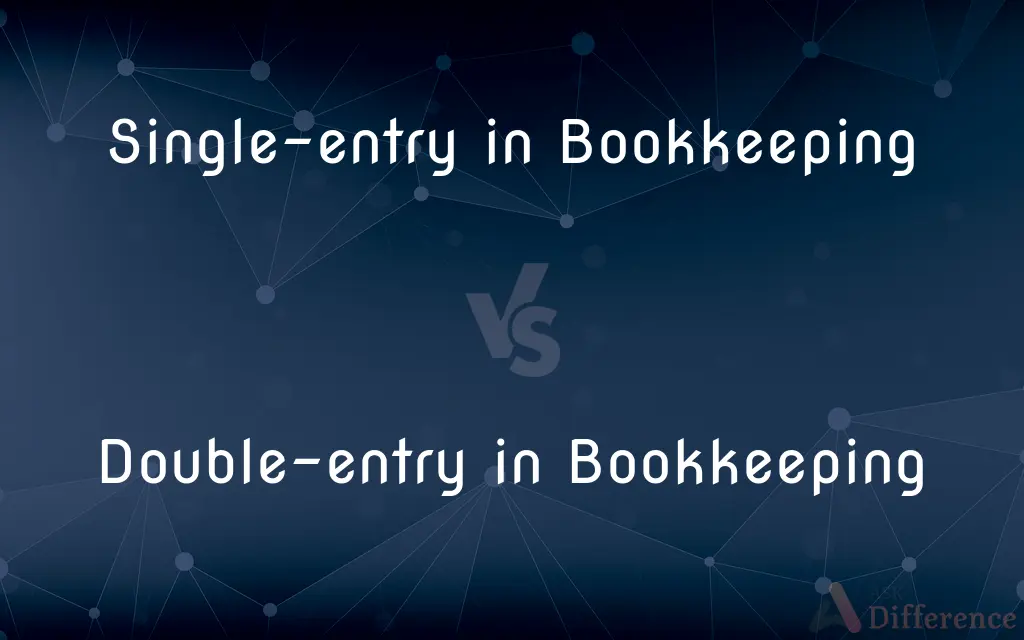Single-entry in Bookkeeping vs. Double-entry in Bookkeeping — What's the Difference?
By Tayyaba Rehman — Published on December 20, 2023
Single-entry in Bookkeeping records only one side of a transaction; Double-entry in Bookkeeping records both debit and credit for every transaction.

Difference Between Single-entry in Bookkeeping and Double-entry in Bookkeeping
Table of Contents
ADVERTISEMENT
Key Differences
Single-entry in Bookkeeping is a straightforward system, primarily used by small businesses and individuals. In this method, only one side of a transaction gets recorded, typically the inflow or outflow of cash. On the other hand, Double-entry in Bookkeeping ensures every transaction impacts at least two accounts. For instance, if a business takes out a loan, it receives cash (asset increase) and incurs a liability (loan payable).
Single-entry in Bookkeeping might be likened to a checkbook register where one notes down either the income or expense. It doesn't provide a complete picture of a company's financial position. Conversely, Double-entry in Bookkeeping offers a comprehensive view as every transaction is balanced out. If a company buys a piece of equipment, its assets increase, but its cash decreases.
Single-entry in Bookkeeping is simpler to maintain but is less detailed and lacks the checks and balances present in the double-entry system. In contrast, Double-entry in Bookkeeping, being a more structured approach, provides a clearer picture of a business's financial health by showing how each transaction affects the entire accounting equation.
Single-entry in Bookkeeping does not adhere to the accounting equation (Assets = Liabilities + Equity). It can be challenging to prepare accurate financial statements using this system. However, Double-entry in Bookkeeping adheres strictly to the accounting equation, ensuring that the books always balance, making it easier to detect errors or fraud.
Single-entry in Bookkeeping is best suited for small, cash-based businesses without complex transactions. But for larger businesses with multiple financial activities, Double-entry in Bookkeeping is the preferable choice due to its detailed nature and error-checking capabilities.
ADVERTISEMENT
Comparison Chart
Transaction Recording
One side of transaction
Both debit and credit
Complexity
Simpler system
More detailed and structured
Error Detection
Limited capability
Easier to detect errors
Financial Picture
Less comprehensive
Comprehensive view
Suitability
Small, cash-based businesses
Larger businesses
Compare with Definitions
Single-entry in Bookkeeping
An accounting system lacking checks and balances inherent in other methods.
As the business grew, the limitations of Single-entry in Bookkeeping became evident.
Double-entry in Bookkeeping
An approach suited for businesses with multiple financial activities.
Given the diverse revenue streams, the conglomerate used Double-entry in Bookkeeping.
Single-entry in Bookkeeping
A simple accounting method recording only one side of a transaction.
Many freelancers use Single-entry in Bookkeeping for its simplicity.
Double-entry in Bookkeeping
A structured approach making it easier to detect errors or fraud.
With Double-entry in Bookkeeping, the accountant caught the discrepancies faster.
Single-entry in Bookkeeping
A system akin to a checkbook register where income or expenses are noted.
For his personal finances, Jake preferred Single-entry in Bookkeeping.
Double-entry in Bookkeeping
A method adhering to the accounting equation ensuring books always balance.
By practicing Double-entry in Bookkeeping, the firm maintained consistent financial integrity.
Single-entry in Bookkeeping
An approach best suited for cash-based small businesses.
The local bakery uses Single-entry in Bookkeeping, given their straightforward transactions.
Double-entry in Bookkeeping
An accounting method recording both debit and credit of a transaction.
Corporations prefer Double-entry in Bookkeeping for its comprehensive nature.
Single-entry in Bookkeeping
A method not adhering to the standard accounting equation.
Without adhering to the accounting equation, Single-entry in Bookkeeping can be limiting.
Double-entry in Bookkeeping
A system providing a complete financial picture by affecting at least two accounts.
Through Double-entry in Bookkeeping, the company could see how buying equipment affected their finances.
Common Curiosities
What is Single-entry in Bookkeeping?
It's a simple system recording only one side of a transaction.
And Double-entry in Bookkeeping?
It records both the debit and credit side of every transaction.
Which is simpler, Single-entry or Double-entry in Bookkeeping?
Single-entry is simpler, while double-entry is more structured.
Can Single-entry in Bookkeeping show a company's complete financial picture?
No, it provides a less comprehensive view compared to double-entry.
How does Double-entry in Bookkeeping enhance error detection?
By affecting at least two accounts, discrepancies are more evident.
Can you prepare accurate financial statements with Single-entry in Bookkeeping?
It can be challenging compared to the double-entry system.
How does Double-entry in Bookkeeping affect the accounting equation?
Every transaction impacts it, ensuring assets always equal liabilities plus equity.
Does Double-entry in Bookkeeping adhere to the accounting equation?
Assets = Liabilities + Equity.
Why do many businesses prefer Double-entry in Bookkeeping?
It offers a detailed financial view and ensures books balance.
Why might a small business opt for Single-entry in Bookkeeping?
For its simplicity and straightforwardness.
Is Single-entry in Bookkeeping suited for large corporations?
It's best for smaller, cash-based businesses.
What's a primary limitation of Single-entry in Bookkeeping?
Lack of checks and balances present in the double-entry system.
Can a growing business transition from Single-entry to Double-entry in Bookkeeping?
Yes, many do as they expand and require more detailed accounting.
Is Single-entry in Bookkeeping akin to a checkbook register?
Yes, it's similar in recording either income or expense.
Which system, Single-entry or Double-entry in Bookkeeping, is more resistant to fraud?
Double-entry due to its checks and balances.
Share Your Discovery

Previous Comparison
Sambo vs. MMA
Next Comparison
Positive Control vs. Negative ControlAuthor Spotlight
Written by
Tayyaba RehmanTayyaba Rehman is a distinguished writer, currently serving as a primary contributor to askdifference.com. As a researcher in semantics and etymology, Tayyaba's passion for the complexity of languages and their distinctions has found a perfect home on the platform. Tayyaba delves into the intricacies of language, distinguishing between commonly confused words and phrases, thereby providing clarity for readers worldwide.












































